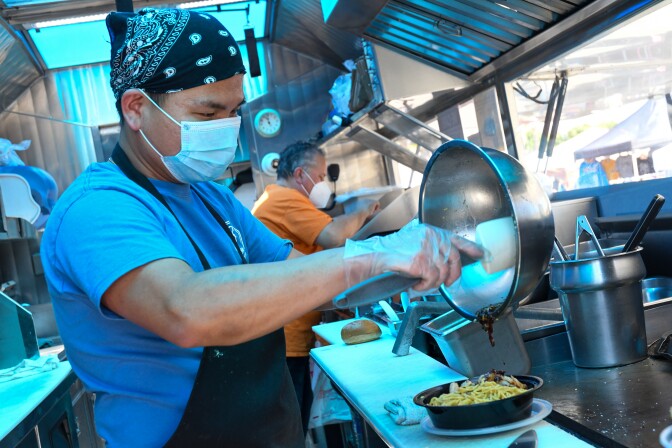This story is free to read because readers choose to support LAist. If you find value in independent local reporting, make a donation to power our newsroom today.
LA ‘No-Vending’ Zone Trial Postponed Again As Street Vendors Push For Settlement

Hollywood street vendors and advocates who sued Los Angeles over no-vending zones in late 2022 said Wednesday they are postponing trial again in hopes of reaching a settlement with the city.
The case was set to go to trial in February, but has been postponed three times now as negotiations continue.
Vendor advocates said the judge in the case has granted a final continuance to postpone the trial date from what was supposed to be Thursday to July 16.
“If a satisfactory resolution between the parties cannot be reached by July 16, the sidewalk vendors, vendor advocates, and their counsel are fully prepared to take our case to trial and ask a judge to order the City to fully comply with state law and to make vendors whole,” Public Counsel, one of three law firms representing the plaintiffs pro-bono, said in a statement.
The Los Angeles area is home to an estimated 50,000 street vendors, 10,000 of whom sell food.
The lawsuit, filed by street vendor plaintiffs along with three community organizations, alleges that no-vending zones conflict with SB 946, the 2018 state law that decriminalized street vending. At the time, when Los Angeles initiated its own rules for legal street vending, eight busy and lucrative areas remained off limits to street vendors, including the Hollywood Walk of Fame, Dodger Stadium, and Universal CityWalk. Vendors were barred from setting up within 500 feet of these areas, and faced tickets and fines if they did.
Since the lawsuit was filed, much has changed: In February, city leaders voted to do away with all no-vending zones save for Venice Beach, where street vending is only allowed if tied to First Amendment rights. Street vending would no longer be prohibited in the other locations, including popular Hollywood Boulevard, where the aroma of bacon-wrapped hot dogs beckons hungry tourists.
But the street vendors and their advocates have not dropped the case for a couple of reasons: one of them, tickets. During the no-vending zone years, street vendors continued to take their chances in prohibited areas where the money was good, especially the Walk of Fame.
As Hollywood Boulevard fruit and hot dog vendor Edgar Suy told LAist in 2023: “Where am I going to sell, Sunset? What would I do on Sunset? There are only cars there, no one is walking on the sidewalk, who can I sell to there?”

And as they took their chances, these street vendors amassed tickets and fines. One thing the vendor plaintiffs are pushing for in a settlement is that the city will agree to dismiss tickets they racked up in the now-repealed no-vending zones, and refund what they’ve paid so far.
“Given the number of citations issued over the past five years, it is critical that the Parties ensure that all citations are fully rescinded and all refunds are made to these business owners,” Public Counsel said in a statement last month.
Joshua Busch, a spokesman for Public Counsel, told LAist this week that vendors continue to receive tickets in the former no-vending zones for other things, like being too close to a red curb or to a business entrance. A recently introduced city council motion aims for a more measured approach.

"We acknowledge that our current system for street vending doesn’t operate as intended,” said city council member Hugo Soto-Martinez, who introduced the motion and represents the Walk of Fame area, in an emailed statement. “Our goal is to work with vendors, advocates, and businesses to build a system that can work for everyone.”
The plaintiffs are also hoping the city will remove remaining restrictions that bar street vendors from doing business within 500 feet of temporary events like farmers’ markets and swap meets, as well as schools.
The city attorney’s office did not immediately respond to a request for comment.







